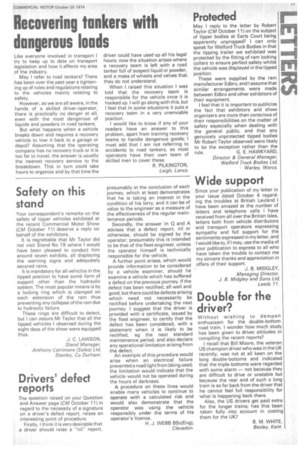Recovering tankers with dangerous loads
Page 79

If you've noticed an error in this article please click here to report it so we can fix it.
Like everyone involved in transport I try to keep up to date on transport legislation and how it affects my area of the industry.
May I refer to road tankers? There has been over the past year a tightening up of rules and regulations relating to the vehicles mainly relating to safety.
However, as we are all aware, in the hands of a skilled driver-operator, there is practically no danger at all, even with the most dangerous of liquids and powders in road tankers.
But what happens when a vehicle breaks down and requires a recovery vehicle to tow it back to a garage or depot? Assuming that the operating company has no recovery truck or it is too far to travel, the answer is usually the nearest recovery service to the breakdown. This in turn could take hours to organize and by that time the driver could have used up all his legal hours; now the situation arises where a recovery team is left with a road tanker full of suspect liquid or powder, and a mass of wheels and valves that they do not understand.
When I raised this situation I was told that the recovery team is responsible for the vehicle once it is hooked up. I will go along with this, but I feel that in some situations it puts a recovery team in a very unenviable position.
I would like to know if any of your readers have an answer to this problem, apart from training recovery teams to handle dangerous goods; I must add that I am not referring to accidents to road tankers, as most operators have their own team of skilled men to cover these.
R. PILKINGTON, Leigh, Lancs.












































































































































